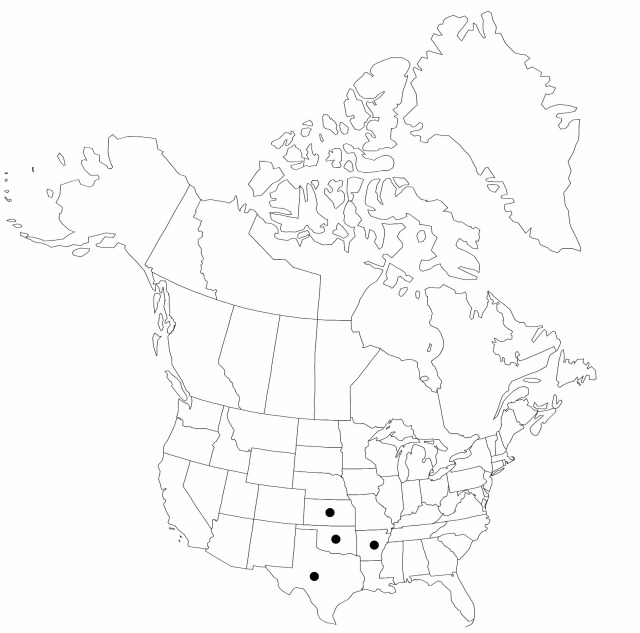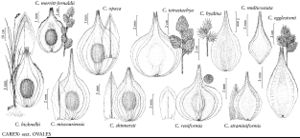Carex shinnersii
Novon 11: 225, fig. 3E. 2001.
Plants densely cespitose, to 200 culms together; rhizomes appearing elongate in old clumps. Culms 40–110 cm; vegetative culms inconspicuous with 9–17 leaves mostly clustered near apex of culm. Leaves: sheaths abaxially green or with pale intervenal areas with scattered, horizontal green septa, adaxially hyaline band broad, smooth, summit concave to truncate, equaling to extending 2 mm beyond collar; ligules 1.8–4.8 mm; blades 4–6 per fertile culm, 2.5–35 cm × 1.8–4.2 mm. Inflorescences erect to slightly arching, compact to elongated, pale-brown, 2.8–5.9 cm × 6–17 mm; proximal internode 3.5–12 (–17) mm; 2d internode 3–9 (–13) mm; proximal bracts scalelike, often with bristle tips shorter than inflorescences. Spikes (3–) 4–7 (–11), distinct, ovoid, 9.5–20.5 × 6–9 mm, base rounded to tapered, apex rounded. Pistillate scales pale-brown with narrow yellow-green to brown midstripe prominent to tip, lanceolate, (3.7–) 4–5.2 mm, (2.6–) 2.9–3.7 (–4.2) times as long as wide, reaching base to middle of perigynium beak, shorter than perigynia by (0.4–) 0.6–1.4 (–1.6) mm, margin hyaline, apex firm and herbaceous, flat or inrolled, with subulate tip or awned. Staminate scales acuminate. Anthers (1.8–) 2.2–3.6 mm. Perigynia 15–80 on larger spikes, ascending, yellowish green to brown with paler margins, conspicuously 7–11-veined abaxially, faintly (0–) 2–8-veined adaxially, wings with 1–4 veins, ovate, elliptic, or ± orbiculate, planoconvex, (4.5–) 4.8–6.1 (–6.3) × 2.5–3.8 mm, 0.5–0.7 mm thick, herbaceous, opaque with achene not clearly visible through adaxial face of perigynium, base rounded, margin flat, including wing 0.5–1.3 mm, smooth; beak yellowish green to pale-brown, strongly flattened, (1.2–) 1.5–2.1 (–2.3) mm, serrulate-margined to apex, abaxial suture pale or copper-brown, distance from beak tip to achene (2–) 2.3–3.3 mm. Achenes ovate to elliptic, 1.8–2.4 × 1.3–1.7 mm, 0.5–0.7 mm thick, apiculum to 0.4–0.9 mm. 2n = 60.
Phenology: Fruiting early summer.
Habitat: Seasonally wet to dry, grassy ditches, swales, and slopes, often in clayey soils
Elevation: 100–300 m
Distribution

Ark., Kans., Okla., Tex.
Discussion
Selected References
None.
Lower Taxa
"shortened" is not a number."+timesaslongasinflorescences" is not declared as a valid unit of measurement for this property."not undefined" is not a number.
